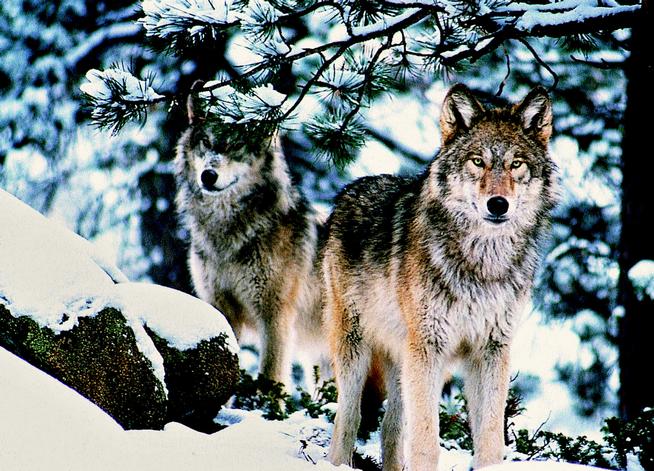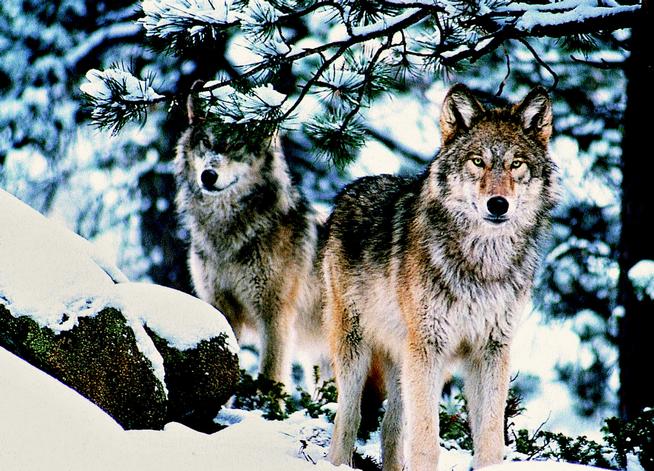
** FILE ** In this undated photo released by the Southern Rockies Wolf Restoration Project, two gray wolves are shown in the wild. Colorado wildlife managers on Thursday, Jan. 13, 2005, proposed letting ranchers shoot wolves migrating from other states if they’re caught attacking livestock. (AP Photo/Southern Rockies Wolf Restoration Project, File)
The majority of Coloradans want wolves back in the state. Unfortunately, the people who could make that happen have other plans.
This month, the Colorado Parks & Wildlife Commission intends to adopt a resolution opposing the introduction of both gray and Mexican wolves into the state. This resolution is wrong financially and ecologically, and is not in the best interests of Colorado.
Colorado has much of the best unoccupied wolf habitat in the American West, and could support more than 1,100 wolves in refuges like Rocky Mountain National Park.
Seventy percent of Colorado residents supported returning wolves in 1994, according to a survey by the U.S. Fish and Wildlife Service. A 2013 survey commissioned by Defenders of Wildlife shows that the same large majority of Coloradans support returning wolves today. Yet we are still waiting.
Instead of listening to the majority of Coloradans who want wolves back in their historic range, the commission is poised to voice opposition to wolf reintroductions before they’ve even begun.
The commission’s preemptive strike against wolves is not representative of Coloradans. Rather, it appeases a narrow range of hunting and agricultural interests. State wildlife agencies get the majority of their money from hunting tags and trapping licenses. People with other interests don’t get heard, even though wildlife watchers outnumber and outspend hunters nationwide, according to a 2011 U.S. Fish and Wildlife survey of money spent on equipment, tags, permits, food, and lodging by hunters, anglers and wildlife-watchers.
At WildEarth Guardians, we support changing how wildlife agencies are funded so that non-hunters’ concerns are recognized and included in decision-making. For example, a tax on equipment such as binoculars, field guides or telephoto lenses could support wildlife agencies, similar to the federal tax on guns and ammunition that helps fund them now. But as long as the current funding system creates bias towards hunters and trappers, the vast majority of us who value keeping wildlife alive and in the wild will need to make sure the commission hears us. And our message is: Colorado needs wolves.
The absence of wolves causes chain reactions in wild systems that harm some of our most beautiful places. Wolves balance the impacts of large elk herds by keeping them alert and moving, preventing them from camping out by streams and overgrazing the fragile banks. Instead of wolves naturally controlling the exploding elk population in Rocky Mountain National Park, we have sharpshooters gunning down the animals and 12-foot-tall exclusion fences pockmarking otherwise gorgeous streamside areas.
In addition to missing out on ecological benefits of wolves, the commission is turning its back on potential economic benefits. Wolf-related tourism earns about $35.5 million annually for Wyoming, Idaho and Montana. Instead of tapping into this potential wildlife watching market, the commission is fixated on preserving the moneymakers of the past: ranching and hunting.
Wolves certainly can affect ranching operations, but that impact is minor compared to other causes of livestock death, including disease, birthing problems and bad weather. Additionally, compensation programs exist to reimburse ranchers who lose livestock to wolves. Claims from the livestock industry that wolves decimate herds and destroy the ranching economy simply don’t match the numbers. In Idaho, Wyoming and Montana, wolves have killed less than 1 percent of the cattle and sheep inventory, and that’s including unverified kills.
To be sure, ranching is part of Colorado’s heritage. But we should question the way our commission prioritizes it above our natural heritage.
Ranchers and hunters have a larger voice in wildlife management than people using our public lands for wildlife watching, hiking, camping and wildlife photography. This is unfair and unrepresentative of the people of Colorado.
There are tools in place to bring wolves back and restore balance to ecosystems while addressing the concerns of people who might be affected. Instead of listening only to the people who complain the loudest, the Colorado Parks & Wildlife Commission should be listening to us all.
Taylor Jones of Denver is a conservation biologist and an endangered species advocate for WildEarth Guardians.
To send a letter to the editor about this article, submit online or check out our guidelines for how to submit by e-mail or mail.
Source: Guest Commentary: Wildlife commission should welcome wolves to Colorado – The Denver Post
